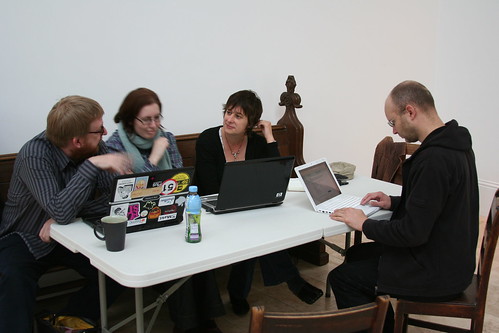
On our way to the June Central Birmingham Social Media Surgery, I worked out that it’s been six months since our first event in the Studio – the first that I was sort-of involved in. In all that time I don’t think we’ve had a better turnout – for the type of people that have come down and the variety of things that they are interested in.
Scanning down the list of names and organisations that turned up, we had – in no particular order – representatives from two hospices, a city centre residents’ group, a campaign for sustainability in Solihull, a basketball club, a neighbourhood forum and people from two social enterprises.
The help
While the Civic Centre Residents Group continued to get help on their posterous blog (it’s their third time down to a surgery), it was great to see people from two hospices come along. Tony Coulson and Daphne Welch of St Mary’s Hospice in Birmingham received help from Michael Grimes with their website. Mark Binnersley, who is also at the St Mary’s Hospice was helped with Twitter by Catherine Howe – who had come from Brighton to learn more about what the Social Media Surgeries are like here in Birmingham and very kindly stepped in when it looked like we were running out of surgeons.
Given that was only five minutes into the evening – and we already had a pretty full set of tables – it was something of a relief. But she wasn’t the only person more than happy to help out with some of the great variety of different issues that we dealt with that night.
Goodbye to Heidi
Heidi Blanton, who has only recently become a social media surgeon, was charged with helping Paula Mitchell and Jane Hartnell of Acorns Hospice. Sadly this is likely to be the last surgery that Heidi can attend, because she’ll be heading back to the USA for a while, but we hope to see her – at least for a visit – in the not-too-distant future.
Paula and Jane were looking for help with using social networks, such as Twitter and Facebook to better communicate with the many people who have an association with the hospice. But they also had an inquiry about how they might be able to get news feeds onto their websites with RSS – after Paula was approached by someone trying to sell them the service for a very large amount of money!
Transitions Sutton Coldfield
Another particularly interesting arrival was Lenka Moore, from Transition Sutton Coldfield. I’d not heard of Transition before tonight, but you can learn more about it by visiting the Transition Network site. Andy Mabbett helped Lenka to set up a WordPress.com blog (which I’m trying to find the url for) for the organisation – which looks to make local communities more sustainable in a time of environmental and economic challenges. I asked Lenka a few questions about her organisation and what it hoped to get from setting up a blog.
[youtube:http://www.youtube.com/watch?v=pA6ruktyk4s]


